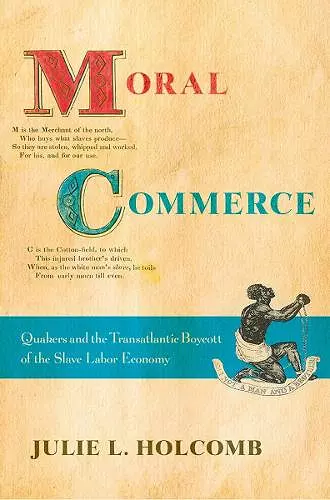Moral Commerce
Quakers and the Transatlantic Boycott of the Slave Labor Economy
Format:Paperback
Publisher:Cornell University Press
Published:15th Jun '20
Currently unavailable, and unfortunately no date known when it will be back
This paperback is available in another edition too:
- Hardback£37.00(9780801452086)

How can the simple choice of a men’s suit be a moral statement and a political act? When the suit is made of free-labor wool rather than slave-grown cotton. In Moral Commerce, Julie L. Holcomb traces the genealogy of the boycott of slave labor from its seventeenth-century Quaker origins through its late nineteenth-century decline. In their failures and in their successes, in their resilience and their persistence, antislavery consumers help us understand the possibilities and the limitations of moral commerce.
Quaker antislavery rhetoric began with protests against the slave trade before expanding to include boycotts of the use and products of slave labor. For more than one hundred years, British and American abolitionists highlighted consumers’ complicity in sustaining slavery. The boycott of slave labor was the first consumer movement to transcend the boundaries of nation, gender, and race in an effort by reformers to change the conditions of production. The movement attracted a broad cross-section of abolitionists: conservative and radical, Quaker and non-Quaker, male and female, white and black.
The men and women who boycotted slave labor created diverse, biracial networks that worked to reorganize the transatlantic economy on an ethical basis. Even when they acted locally, supporters embraced a global vision, mobilizing the boycott as a powerful force that could transform the marketplace. For supporters of the boycott, the abolition of slavery was a step toward a broader goal of a just and humane economy. The boycott failed to overcome the power structures that kept slave labor in place; nonetheless, the movement’s historic successes and failures have important implications for modern consumers.
Moral Commerce will appeal to a broad range of readers, from students in upper division undergraduate college courses to graduate students to informed readers in general. This account should certainly be read by every scholar of both American and British antislavery, black nationalism, African recolonization, and social reform movements.
* H-Pennsylvania *In this important, scholarly and highly detailed new book, Julie L. Holcomb carefully examines how the Free Produce Movement took shape: its history, scope and remit, successes, failures, key players and complex organisation.... The combination of broader brushstrokes and fine detail, drawn from a wealth of primary sources, will provide fascinating reading for both specialist and non-specialist readerships.
* Quaker Studies *The most carefully contextualized, thorough history of the "free-produce" movement, which boycotted goods made by slave labor and pushed to market free-labor-made products, persuasively argues for the historical importance of the free-produce minority within the minority of abolitionists.
* Journal of American History *In this important, scholarly, and highly detailed new book, Julie L. Holcomb examines the successes and failures of the free produce movement.... Contributes considerably to our understanding of the ideologies, mechanisms, and impacts of free produce.... Richest in its meticulous exploration of free produce within American culture.
* Winterthur Portfolio *A fascinating account that brings new sources and perspectives to bear on Quaker abolitionist activism.... Persuasively situates the history of abolitionist boycotts within the dynamic context of Quaker criticisms of transatlantic consumer culture and moral repugnance in the face of slavery's brutality.
* American Historical Review *Holcomb demonstrates how the movement forced otherwise neutral parties to take a side in the debate, ensuring the discussion around free-labor goods remained relevant to the antislavery plight. Her study is a significant addition to the historiography of the free-labor movement, and her excellent work is a must-read for anyone interested in the study of the antislavery movement and Quakerism.
* Reading Religion *Moral Commerce: Quakers and the Transatlantic Boycott of the Slave Labor Economy meticulously chronicles the transformation of mid-seventeenth-century Biblically-based Quaker opposition to consuming commodities produced from slave labor to an international movement equally grounded in spiritual and secular concerns.
* The North Carolina Historical Review *Moral Commerce touches on labor, political, social, and cultural history in eight wide-ranging chapters of less than 300 pages. Holcomb provides readers with an engaging and concise narrative that, among other things, examines a key question that the book sets out to answer; that is, to what extent was the boycott a Quaker movement?
* The Journal of African American HistoISBN: 9781501748493
Dimensions: 229mm x 152mm x 19mm
Weight: 454g
272 pages